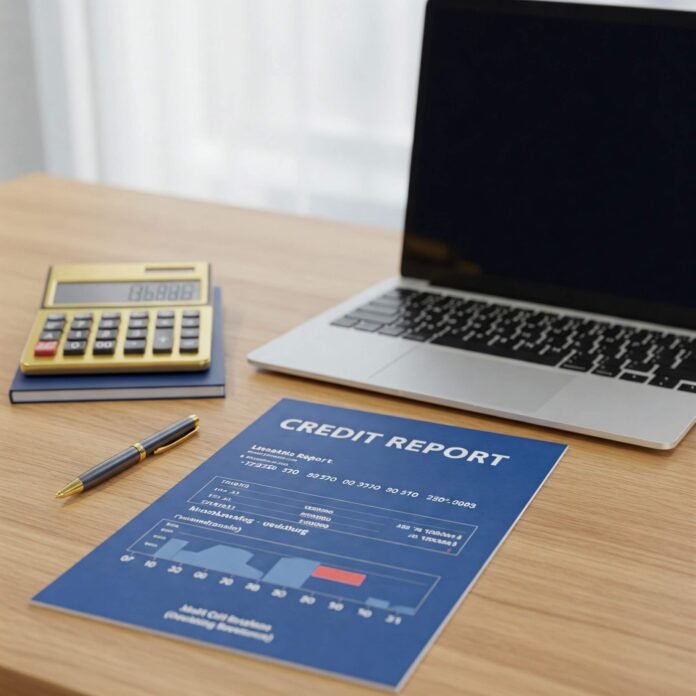Understanding your credit report is like trying to read the fine print on a medicine bottle while your neighbor’s dog barks like it’s auditioning for the apocalypse. I’m sitting in my tiny Queens apartment, the radiator hissing like it’s got beef, surrounded by empty seltzer cans and a credit report that looks like it was written in code. First time I pulled mine, I legit thought it was a prank—random numbers, weird terms, and my name spelled wrong, like, really? I’m spilling my guts here, ‘cause I’ve screwed this up so many times, and I’m still not some finance wizard. So, grab a snack or whatever, and let’s wade through this mess together.
Why Understanding Your Credit Report Feels Like a Bad Reality Show
So, I’m slouched on my couch last Tuesday, rain smacking my window, trying to make sense of my credit report while my cat keeps swatting at my phone. This thing’s like a puzzle designed to make you cry—sections called “credit utilization” and “inquiries” that sound like they belong in a sci-fi flick. It’s basically your financial rap sheet, put together by three companies—Equifax, Experian, TransUnion—who can’t even agree on what my score is. It shows how much you owe, if you paid your bills, and any dumb stuff you did, like that time I thought a $25 cable bill would just vanish.
- What’s in there? Your payment history, debts, how long you’ve had credit, and any oopsies like missed payments.
- Why it matters: Landlords, lenders, even some jobs peek at it to see if you’re a hot mess. No biggie, right?
- My dumb move: I ignored a $10 parking ticket ‘cause I thought it was a mistake. Spoiler: it wasn’t, and it haunted my report for ages.
Check out Experian’s guide for a rundown—it’s actually readable, unlike my handwriting.

My Freakout Over “Hard Inquiries”
Okay, true story: I’m at this dive bar in Bushwick, sticky table and all, scrolling my credit report on my phone while sipping a flat soda. I see “hard inquiries” and totally panic, thinking someone stole my identity. Nope, just me applying for three credit cards in a week ‘cause I wanted those travel points. Huge mistake. Understanding your credit report means knowing hard inquiries—like applying for a loan—can ding your score, but soft ones, like checking your own report, are chill. I learned not to go wild with applications. TransUnion’s site explains this better than I ever could.
How to Read Your Credit Report Without Having a Meltdown
I’ve spent way too many nights in my stained sweatpants, chugging cold coffee, trying to decode my credit report without throwing my laptop out the window. Here’s my not-so-perfect way to do it:
- Personal Info: Your name, address, maybe Social Security number. Mine had my old address from, like, 2020, which was super confusing. Check for mistakes.
- Accounts: Lists your cards, loans, whatever. I found an old Gap card I forgot about—yep, I was that person.
- Payment History: Shows if you paid on time or if you’re like me and “forgot” a bill during a Netflix marathon.
- Public Records: Bankruptcies, liens, that kinda stuff. I’m clear, but I check it like it’s gonna bite me.
You can get your report free at AnnualCreditReport.com. It’s legit, not one of those shady sites that want your firstborn.

The Time I Thought I Was Hacked (I Wasn’t)
So, I’m in my kitchen, eating cereal at 2 a.m., when I spot a weird account on my report. I’m, like, convinced I’m hacked, heart racing, milk dripping on my shirt. Turns out, it was an old phone bill I never closed when I moved. Understanding your credit report means checking every line for errors. I disputed it online at Equifax’s dispute page, which was a pain but worked. If you see something off, don’t spiral—just dispute it.
Tips for Not Totally Botching Your Credit Report
I’ve messed up everything—maxed out a card for a dumb festival, ignored a collections notice ‘cause I thought it was junk, you name it. Here’s what I’ve figured out, sitting here with my cat shedding everywhere and my coffee mug leaving rings on my desk:
- Check it a lot: You get free reports yearly, but I check every few months ‘cause I’m paranoid now. Credit Karma’s okay for a quick look.
- Pay on time: I set up autopay after missing a bill during a TikTok binge. Saved me from myself.
- Keep credit use low: Use less than 30% of your credit limit. I hit 70% once ‘cause of a vet bill—bad move.
- Don’t close old cards: I almost ditched my first card ‘cause I hated the bank, but it helps your score to keep it.
NerdWallet has tips that don’t make you feel like a complete idiot.
My Most Embarrassing Credit Report Fail
Picture me at a fancy coffee shop in Manhattan, trying to look cool while applying for a new apartment. The landlord pulls my report, and there’s a collections notice for a $8 library fine from 2021. A LIBRARY FINE. I wanted to crawl under the table. Understanding your credit report means owning your stupid mistakes. I paid it, disputed it, got the apartment, but I’m still cringing over the barista’s side-eye.

Wrapping Up This Credit Report Disaster
So, yeah, understanding your credit report is like untangling earbuds while slightly hungover—frustrating, messy, but you’ll survive. I’m still learning, sitting here with my cat judging me and my inbox full of bill reminders. My advice? Pull your report, take a deep breath, and don’t be me. You’ll screw up—I sure did—but you’ll get it. Check Consumer Financial Protection Bureau for real advice, or hit me up on X—I’m no pro, but I’ve got stories.ol of your financial future.
Outbound links:



